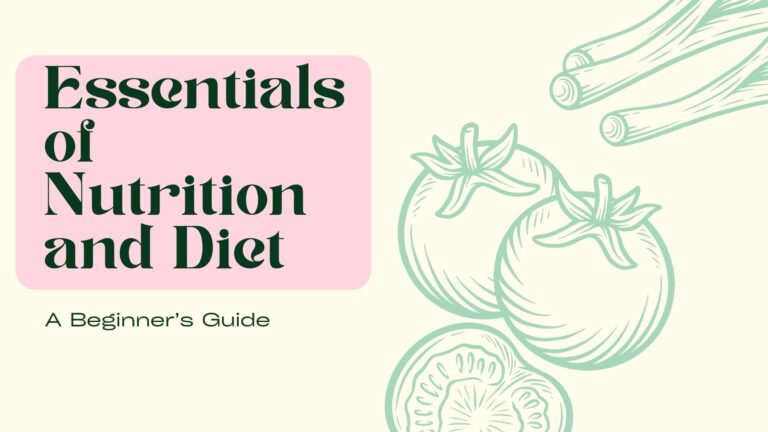In today’s fast-paced world, understanding nutrition is more important than ever. With so many food choices and trends, it can be easy to feel overwhelmed about what to eat. But here’s the good news—building a solid understanding of nutrition and how it affects your body can set you on the path to better health. This beginner’s guide breaks down the essentials of nutrition and diet, helping you make informed choices that fuel your body and support a healthy lifestyle.

The Building Blocks of Nutrition
Nutrition isn’t just about counting calories—it’s about fueling your body with the right types of nutrients that it needs to function properly. These nutrients come in two main categories: macronutrients and micronutrients.
Understanding Macronutrients
Macronutrients are the primary nutrients your body needs in large amounts. They include carbohydrates, proteins, and fats. These nutrients provide your body with energy, support muscle growth, and maintain vital bodily functions.
The Role of Micronutrients
Micronutrients, including vitamins and minerals, are needed in smaller quantities but are equally important. These nutrients help regulate metabolism, support immune function, and maintain bone health.
What is a Balanced Diet?
Eating a balanced diet means providing your body with the right mix of macronutrients and micronutrients. No single food can give you all the nutrients your body needs, which is why variety is key.
The Importance of Variety
A varied diet ensures that you get a wide range of nutrients. Eating the same foods repeatedly may lead to nutrient deficiencies, so it’s important to include different fruits, vegetables, proteins, and whole grains in your meals.
The Plate Method for Balanced Meals
A simple way to ensure you’re eating a balanced diet is by using the “plate method.” Divide your plate into four sections: half for vegetables and fruits, a quarter for lean proteins, and a quarter for whole grains. This method helps you visually balance your meals without needing to count calories.
Essential Macronutrients
Carbohydrates: The Body’s Energy Source
Carbohydrates are the body’s primary source of energy. They are found in foods like bread, rice, pasta, and vegetables. Carbs are broken down into glucose, which fuels your brain and muscles.
Proteins: The Building Blocks of Life
Proteins are essential for muscle repair, immune function, and hormone production. Good sources of protein include lean meats, fish, beans, and nuts. Aim to include a protein source in each meal.
Fats: Good vs. Bad Fats
Not all fats are created equal. Healthy fats, like those found in avocados, olive oil, and fatty fish, are essential for brain function and heart health. On the other hand, trans fats and saturated fats, often found in processed foods, should be limited as they can increase the risk of heart disease.

Understanding Micronutrients
Vitamins: The Spark Plugs of the Body
Vitamins are organic compounds that your body needs to function. For example, Vitamin D supports bone health, Vitamin C boosts your immune system, and B vitamins help your body convert food into energy.
Minerals: Critical for Growth and Function
Minerals like calcium, magnesium, and potassium are essential for bone health, muscle contraction, and nerve signaling. A diet rich in leafy greens, nuts, seeds, and dairy products ensures you’re getting enough minerals.
Water: The Often Overlooked Nutrient
The Importance of Staying Hydrated
Water is crucial for nearly every bodily function. It helps regulate temperature, aids digestion, and keeps your skin healthy. Even mild dehydration can impact energy levels and cognitive function.
Signs of Dehydration
If you feel thirsty, you’re already mildly dehydrated. Other signs include dark urine, headaches, and fatigue. To stay hydrated, aim to drink water consistently throughout the day.
Fiber: Supporting Digestive Health
Types of Fiber
Fiber comes in two forms: soluble and insoluble. Soluble fiber helps lower blood sugar and cholesterol levels, while insoluble fiber promotes healthy digestion by moving food through the digestive system.
How Fiber Benefits Your Body
Fiber is not only essential for digestive health but also helps you feel full longer, aiding in weight management. Good sources of fiber include fruits, vegetables, whole grains, and legumes.
How to Build a Healthy Plate
Building a nutrient-dense plate doesn’t have to be complicated. Start with whole, unprocessed foods as your foundation.
Whole Grains Over Refined Grains
Opt for whole grains like quinoa, brown rice, and whole wheat bread instead of refined grains like white bread and pasta. Whole grains are packed with fiber, vitamins, and minerals, whereas refined grains have been stripped of many of these nutrients.
Incorporating Fruits and Vegetables
Fill half your plate with colorful fruits and vegetables. These are rich in vitamins, minerals, and antioxidants that support overall health and protect against disease.
Choosing Lean Proteins
Lean proteins like chicken, turkey, tofu, and legumes are lower in fat but still high in essential amino acids. Including a variety of protein sources ensures that you get all the nutrients your body needs.
Understanding Portion Control
Why Portions Matter
Even healthy foods can lead to weight gain if you eat too much of them. Understanding portion sizes helps you manage your calorie intake without needing to give up the foods you love.
How to Measure Proper Portions
Using your hand as a guide can be helpful: your palm is a good measure for proteins, your fist for vegetables, and a cupped hand for carbohydrates. This ensures you’re eating the right amount of each food group.

Healthy Eating Habits
Mindful Eating
Mindful eating involves paying attention to your body’s hunger and fullness cues, avoiding distractions while eating, and savoring each bite. This can help prevent overeating and lead to better digestion.
Meal Planning and Preparation
Planning your meals ahead of time helps you make healthier choices and prevents the temptation of fast food or unhealthy snacks. Preparing meals in advance also saves time during busy weekdays.
Common Diet Myths Debunked
Carbs Are Bad for You
Carbohydrates have gotten a bad reputation, but not all carbs are created equal. Whole grains and vegetables provide important nutrients and are a necessary part of a balanced diet.
Eating Fat Makes You Fat
Eating healthy fats does not lead to weight gain. In fact, fats are essential for many bodily functions and can help you feel full, reducing the likelihood of overeating.
How to Maintain a Healthy Diet Long-Term
Sustainability Over Restriction
Rather than following restrictive diets, focus on creating sustainable eating habits. Incorporating a variety of foods and allowing occasional treats helps you maintain a balanced diet over the long term.
Incorporating Treats Without Guilt
There’s no need to feel guilty for enjoying your favorite treats occasionally. Moderation is key—allow yourself small indulgences to satisfy cravings without derailing your progress.
The Benefits of Proper Nutrition
Boosting Energy Levels
Eating the right mix of macronutrients and micronutrients ensures your body has the energy it needs to get through the day. Carbohydrates provide quick energy, while proteins and fats offer sustained fuel.
Improving Mental Clarity
Proper nutrition can also impact cognitive function. A diet rich in omega-3 fatty acids, vitamins, and minerals supports brain health and can improve focus and memory.
Supporting Long-Term Health
Good nutrition plays a crucial role in preventing chronic diseases like heart disease, diabetes, and obesity. By fueling your body with the right nutrients, you can support long-term health and well-being.
Conclusion
Nutrition is not just about what you eat—it’s about building a lifestyle that supports your overall health. By understanding the essentials of nutrition and diet, you can make choices that fuel your body, support your well-being, and set you up for long-term success. Start small, make gradual changes, and remember that balance is key.
FAQs
Is it okay to eat snacks?
Yes, healthy snacks can be part of a balanced diet. Opt for snacks like fruits, nuts, or yogurt instead of processed options.
Do I need supplements if I eat healthily?
Most people can get all the nutrients they need from a balanced diet, but supplements may be necessary in some cases. Consult with a healthcare provider if you're unsure.
How much water should I be drinking daily?
Aim for about 8 glasses (64 ounces) of water per day, but this can vary based on activity level and climate.
How can I make healthy eating more affordable?
Plan your meals, buy seasonal produce, and purchase whole foods in bulk to make healthy eating more budget-friendly.


